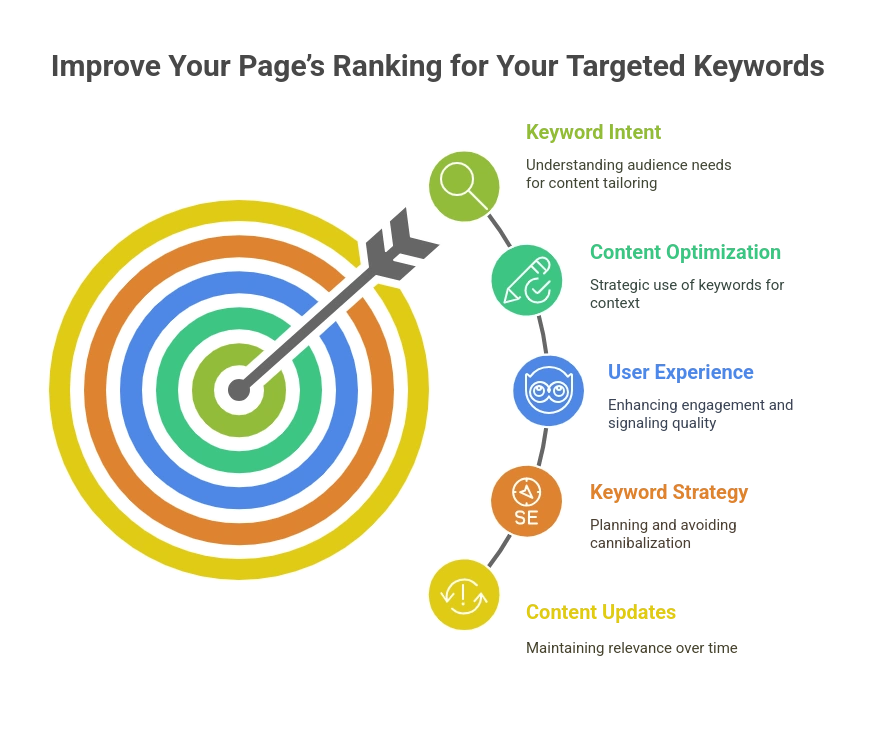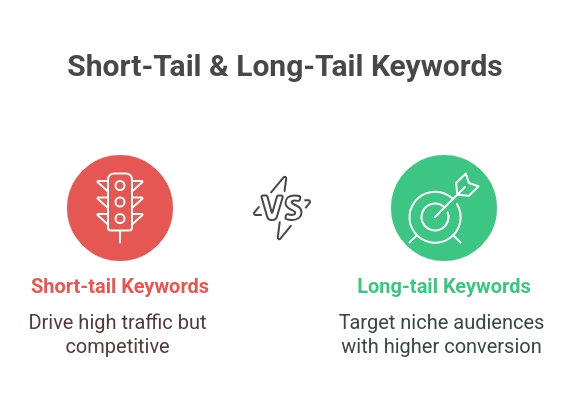Being invisible online is one of the biggest problems for any website owner. You might have created a great page, but when people search for the words you want to show up for, your page doesn’t appear. It’s like having a store, but no one can find it because the sign is missing.
Did you know that around 92% of keywords searched on Google get no clicks from organic search results beyond the first page? This means if your page isn’t ranking on that crucial first page for your target keyword, it’s almost invisible to most users.
But why does this happen? Why isn’t your page showing up for the keyword you worked so hard to target? There are many reasons behind this — it could be technical issues, your content might not be strong enough, or your site might not be set up the right way for search engines.
So, if you’re struggling with this problem, working with the best SEO agency in India can help identify why your page isn’t showing up. There are many reasons behind this — it could be technical issues, your content might not be strong enough, or your site might not be set up the right way for search engines.
In this blog, we’ll look at the main reasons why your page isn’t appearing for your target keyword and share simple ways you can fix it to get better SEO visibility and more visitors.
Table of Contents
- Understanding the Importance of Targeted Keyword Contextual Targeting
- A Visual Guide to Keyword Targeting and On Page SEO
- Common Reasons Why Your Page Isn’t Appearing For Your Target Keyword
- How to Improve Your Page’s Ranking for Your Targeted Keywords
- Common SEO Mistakes That Hurt Your Target Keyword Rankings
- The Difference Between Short-Tail and Long-Tail Keywords and Why It Matters
- Getting Your Page to Rank Where It Belongs
- Why Partnering With SEO Discovery Can Boost Your Keyword Rankings
- FAQs on Target Keyword
Understanding the Importance of Targeted Keyword Contextual Targeting
Before diving into reasons why your page isn’t appearing, it’s important to understand what targeted keyword contextual targeting means. This is the practice of optimizing your website and content to rank specifically for the keywords that are most relevant to your targeted audience keywords.
Search engines like Google don’t just match keywords; they try to understand the context behind the search query. So, using your target keyword in a way that fits naturally with your content topic, and the intent of your audience, is key. This is what keyword contextual targeting aims to achieve — helping search engines understand your content is the best fit for a specific search intent.
For example, if you run a gardening store and want to rank for the targeted keyword “organic fertilizer,” your content should not only include the phrase “organic fertilizer” but also related terms, usage instructions, benefits, and customer questions. This builds a strong context and increases your chances of ranking higher.
A Visual Guide to Keyword Targeting and On Page SEO
To understand why your page may not be appearing, it’s helpful to see a visual guide to keyword targeting and on page SEO — the backbone of ensuring your page is correctly optimized.
Here’s a quick breakdown of how on page SEO affects your page’s ranking:
- Title Tag: Your target keyword should appear naturally in the title tag of your page.
- Meta Description: While not a ranking factor, including the keyword here improves click-through rates.
- Headers (H1, H2, H3): Use your target keyword and related terms in your headings for better structure.
- Content: The keyword should appear naturally within the body, supported by semantically related keywords.
- Image Alt Text: Use relevant keywords in image alt attributes to help Google understand visuals.
- URL Structure: Keep URLs short and include your target keyword if possible.
- Internal Linking: Internal linking to and from other pages using anchor text that reflects your targeted keywords.
If you’re unsure how to optimize your pages, our on page SEO services ensure each element follows best practices.
Common Reasons Why Your Page Isn’t Appearing For Your Target Keyword
1. Poor Keyword Research or Targeting
Sometimes the problem begins before you even start optimizing. If your keyword choice is too broad, too competitive, or not aligned with your targeted audience keywords, your page will struggle to rank.
Using tools like Google Keyword Planner, Ahrefs, or SEMrush can help you identify the best target keyword based on search volume, competition, and relevance to your audience.
2. Technical SEO Issues
A technical SEO audit service can help identify hidden issues like crawl errors, indexing problems, or poor Core Web Vitals scores that affect your visibility.”
A technical audit can uncover such problems and help you fix them, improving your site’s crawlability and user experience.
3. Weak or Thin Content
Content quality is crucial. If your page has very little content or doesn’t provide meaningful value around the target keyword, search engines will not consider it relevant. You can also consider outsourcing to professional content writing services to ensure quality and relevance
Make sure your content thoroughly covers the topic, answers questions, and uses the targeted keyword naturally alongside related terms.
4. Lack of Backlinks or Poor Authority
One way to build backlinks is by using guest post services on authoritative sites in your industry. Backlinks act as votes of confidence from other websites. If your page or domain has low authority, it will be difficult to rank, especially for competitive keywords.
Building quality backlinks from reputable sites relevant to your niche improves your page’s trustworthiness and helps it appear for your target keyword.
5. Improper On-Page SEO Optimization
Missing the key on-page SEO signals — like not including the target keyword in your title, headings, URL, or meta description — can prevent your page from ranking.
Ensure your target keyword is strategically placed in these important elements without overstuffing or making the content unnatural.
Want To Fix These SEO Issues And Start Ranking Higher?
How to Improve Your Page’s Ranking for Your Targeted Keywords

1. Focus on Keyword Intent
Understand what your audience really wants when they search your targeted keyword. Are they looking to buy, learn, or compare? Tailor your content accordingly.
2. Optimize Your Content Thoroughly
Use a combination of primary and secondary keywords around your targeted audience keywords. This approach helps search engines understand the full context of your content. A well-planned content marketing strategy supports keyword contextual targeting and helps expand topical authority
3. Improve User Experience (UX)
A good user experience, including fast page loading speeds, easy navigation, and mobile-friendliness, keeps visitors engaged and signals quality to search engines.
4. Use a Clear Keyword Strategy
Create a plan around your target keyword and related terms. Avoid targeting the same keyword on multiple pages (keyword cannibalization) as it can hurt your rankings. Also, don’t overlook the power of local SEO services if your business targets a specific region.
5. Regularly Update Content
SEO is ongoing. Keep your content fresh and updated to stay relevant for your targeted keywords.
Common SEO Mistakes That Hurt Your Target Keyword Rankings
When your page isn’t appearing for your target keyword, sometimes the issue lies in simple SEO mistakes that are easy to overlook. These errors can prevent search engines from understanding your content properly or reduce your site’s authority, hurting your chances of ranking well. Here are some common mistakes that impact your targeted audience keywords rankings:
1. Keyword Stuffing
Using your target keyword excessively throughout your content can make it look unnatural and spammy to search engines. This old-school tactic can lead to penalties or lower rankings. Instead, focus on keyword contextual targeting by including your keywords naturally and supporting them with related terms.
2. Ignoring On-Page SEO Basics
Failing to optimize essential on-page elements like the title tag, meta description, headers, and URL with your target keyword can weaken your SEO efforts. These elements tell search engines what your page is about and help improve visibility.
3. Duplicate Content Issues
If multiple pages on your site target the same targeted keyword, you may be creating keyword cannibalization, where your own pages compete against each other in search rankings. This confuses search engines and lowers the overall ranking potential.
4. Poor Content Quality
Thin or low-quality content that doesn’t fully address the topic or the user’s search intent will struggle to rank. Ensure your content is informative, well-structured, and answers the questions related to your target keyword.
5. Neglecting Technical SEO
Technical issues like slow page speed, broken links, or missing XML sitemaps can prevent search engines from crawling and indexing your pages effectively. These problems harm your rankings even if your content is excellent.
6. Not Optimizing for Mobile
With most searches happening on mobile devices, a site that isn’t mobile-friendly can lose ranking potential. Google prioritizes mobile first indexing, so your pages must perform well on smartphones and tablets.
7. Ignoring User Experience Signals
High bounce rates or low dwell time indicate that users aren’t finding your page helpful, which can negatively impact your ranking for your target keyword. Focus on engaging content and an easy-to-navigate design.
The Difference Between Short-Tail & Long-Tail Keywords and which is best for target keyword
When working on SEO, understanding the difference between short-tail and long-tail keywords is crucial for effective keyword contextual targeting. Both types serve different purposes and can impact your website’s visibility and traffic in unique ways.

What Are Short-Tail Keywords?
Short-tail keywords are broad, usually one or two words long, and have a high search volume. For example, a short-tail keyword could be “shoes” or “digital marketing.” Because these keywords are very general, they are highly competitive, making it hard for new or smaller websites to rank on the first page for these terms.
What Are Long-Tail Keywords?
Long-tail keywords are more specific phrases, usually three or more words, like “best running shoes for flat feet” or “affordable SEO agency in India.” These keywords have lower search volume but tend to attract users who are closer to making a decision or purchase. Long-tail keywords are less competitive and often easier to rank for.
Why Does This Matter?
Focusing only on short-tail keywords can be challenging because of intense competition, especially if your site is new or less authoritative. On the other hand, targeting long-tail keywords allows you to reach a more targeted audience with higher chances of conversion. This approach fits well into a smart keyword contextual targeting strategy by combining both types depending on your content and business goals.
How to Use Both Effectively
- Use short-tail keywords to build overall site authority and attract broad traffic.
- Use long-tail keywords to capture specific search intent and engage your targeted audience deeply.
By balancing these keyword types in your SEO efforts, you improve your chances of ranking and driving quality traffic to your site.
Targeted Keywords : Getting Your Page to Rank Where It Belongs
If your page is not appearing for your target keyword, don’t lose hope. Often, simple fixes in your SEO strategy, content quality, and technical setup can make a big difference.
Understanding targeted keyword contextual targeting and following a structured approach to on-page SEO is essential. Whether you do it yourself or work with a trusted SEO agency in India, taking action is the key to improving your rankings and driving more visitors to your site. Sometimes it helps to hire SEO specialist to conduct a full site audit and keyword targeting strategy tailored to your goals.
Why Partnering With SEO Discovery Can Boost Your target keyword Rankings
SEO Discovery is a trusted digital marketing agency known for its deep expertise in technical SEO, content optimization, and effective link building strategies. Our team conducts thorough keyword research and develops a customized keyword contextual targeting plan tailored to your unique business needs. We also offer customized SEO for small businesses, helping you grow your visibility without a massive budget.”
With SEO Discovery, you get more than just initial fixes—our experts continuously monitor your SEO performance and adapt strategies based on real-time data and the latest market trends. This proactive approach ensures your page starts ranking for your target keyword and attracts valuable, high-quality traffic that drives business growth.
Benefits of partnering with us:
- In-Depth Keyword Research
- Technical SEO Expertise
- Content Optimization
- Strategic Link Building
- Continuous Monitoring & Reporting
- Personalized Support
Your Competitors Are Already Optimizing Their SEO — Are You?
FAQs for Why Is My Page Not Appearing For My Target Keyword
A target keyword is the specific word or phrase that you want your webpage to rank for on search engines like Google. It’s what your potential customers are typing in when searching online. Choosing the right keyword ensures your content reaches the right audience and increases your chances of generating quality traffic and conversions.
If your page isn’t appearing for your chosen keyword, it could be due to weak keyword strategy, low content quality, technical SEO problems, poor page speed, lack of authority, or insufficient backlinks. At SEO Discovery, we identify these roadblocks and fix them to help you rank higher, faster.
Effective keyword research is key. Use tools like Google Keyword Planner, Ahrefs, or SEMrush to find keywords with high search volume and low competition. Then, match them with the intent of your target audience. Our experts at SEO Discovery specialize in finding high-converting keywords tailored to your niche.
Keyword contextual targeting means naturally embedding your keyword into relevant and valuable content, rather than forcefully inserting it. Google rewards content that’s helpful and relevant. Our content team ensures your pages are fully optimized without sounding robotic or over-optimized.
SEO is a long-term strategy. It typically takes 3 to 6 months to see significant ranking improvements, depending on competition, domain authority, content quality, and SEO efforts. SEO Discovery’s proven strategies are designed to fast-track your visibility while building long-term authority.
Absolutely. Long-tail keywords are longer, more specific search terms that tend to have lower competition and higher intent. They’re easier to rank for and often result in higher conversion rates. We often recommend starting with long-tail keywords to gain traction quickly.
On-page SEO includes optimizing your titles, headers, content, URLs, internal links, and meta descriptions for the targeted keyword. These elements help search engines understand your content and improve your chances of ranking. SEO Discovery ensures every page element is fine-tuned for performance.
Yes — and they’re crucial. High-quality backlinks from authoritative sites signal trust and credibility to Google. Without backlinks, even well-optimized content may struggle to rank. Our link building services are tailored to boost your domain authority and keyword rankings effectively.


